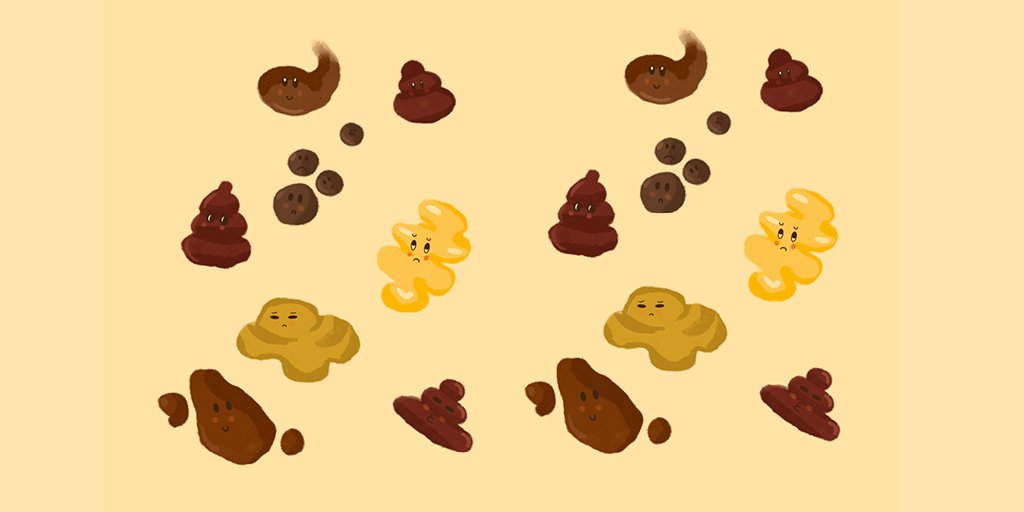Usually, a baby’s poop is an indication of its health. During the first few years of a baby’s life, you’ll be witnessing a range of different poop colours that will shock you. Still, it is important to note that baby poop has no comparison with an adult’s poop; hence, it is wise to observe the colour and texture before making any claims.
Since all newborns tend to eat, sleep, and repeat, their diet keeps changing as they transition into a growing phase of their lives. However, in this article, we will discuss each poop colour while focusing on black.
In babies, black is normal and doesn’t call for any concern, but there may be times when you should reach out for professional medical help.
Types of Poop Colour: What Do They Indicate?
Aside from black, there are a handful of poop colours that you should be aware of so that you don’t go into a panic mood. Therefore, below are some of the most common colours and explanations for why you might see these colours.
Black Poop Colour
In newborn babies, the poop colour of black is deemed normal and healthy. A newborn’s very first stool is most likely to be black with a tar consistency. This texture is more commonly known as meconium.
Meconium is a thick, black stool of cells, mucus, and amniotic fluid. The black stool should last over the first few days and is normal. However, if the colour doesn’t change from black to either yellow or green, then that is a worrying sign. If the colour continues to show up, then seek medical help immediately.
Yellow Poop Colour
Yellow poop colour is also a sign of normal functions in the little one’s body. This poop colour is commonly found among babies who are breastfed.
It is mustard yellow and may also appear to have small flecks in it, which are caused by breast milk that are harmless. These stools may also arrive 3 to 4 times a day and can be firm or runny.
The poop in breastfed babies is stated as “seedy.” It is described so because these seeds may look familiar to cottage cheese curds but are yellow in colour. Extremely runny or frequent yellow poop could result in diarrhoea. This is a dangerous situation as diarrhoea can lead to severe dehydration.
Red Poop Colour
Most new moms consider red poop colour as a sign of distress and may be linked to the bleeding in the digestive system, but it is not entirely true.
Maybe you are seeing red poop colour in your baby’s diaper due to the dark red coloured food items that gave them, e.g. drinks, tomatoes or beets. Or it could be that the red colour is displayed due to an intestine infection that should be reported to a paediatrician.
If you gave your baby something red to eat, you should wait for the poop colour to return to normal, but if that doesn’t happen, it would be best to check with your doctor as soon as possible.
Green Poop Colour
Green Poop colour is probably the most witnessed and familiar in babies. This poop colour is evident in babies slightly older than newborns.
Green poop is bound to appear due to several reasons. The most common is eating foods such as spinach, beans, or green vegetables. Other reasons could be an allergy, slow digestion when the baby has eaten too much, green vegetables or food included in the mother’s diet, and the intake of antibiotics either by the mom or the breastfed baby.
White Poop Colour
White Poop colour screams concern when a baby isn’t producing bile in the liver, making it hard for the food to digest. This is an unusual colour and must be reported to a health care professional at any phase of one’s life.
Causes Of Black Poop
One of the major causes of black poop in newborns is meconium, but other factors also contribute to the black poop.
Another factor or cause of black poop could be in-taking iron formulas. These formulas are needed and given to babies to ensure that they get the optimum amount of iron in their bodies to boost the overall growth process. Thus, it can result in black poop.
But, if your baby is now months old and isn’t taking any iron supplements or iron-fortified formulas, it would be best to have it checked by the doctor. As the diet expands with the child’s age, black poop may appear from time to time and indicate the ingestion of certain foods, e.g. liquorice, grape juice or Oreo cookies. However, frequenting black poop is a dangerous sign and must be discussed with the doctor. Medicines (which contain iron) can also be the reason behind your baby’s black poop.
When To Worry?
Though black poop is normal during the first few days of life, if this colour and a firm texture of the poop persist, then you should call your doctor immediately. The doctor will most likely perform more tests to see any alarming problems such as bleeding in the digestive tract.
Apart from this, it is imperative to note that while your baby is breastfed, they absorb almost all of it; therefore, there may be no poop during the starting days. But some babies may poop a mustard yellow coloured poop after the feeding sessions. This can continue for a few months or weeks. Babies feeding on various milk formulas may poop a darker or tanner colour.
At times, dark green stools passed by the baby may look black under poor lighting. To double-check whether it is black poop or not, you can always take a bit of the stool on white paper and then look at it under proper lighting. Most of the time, this trick can help, and you confirm that it is indeed green, which is normal in babies.
Conclusion
The bottom line is that whatever your baby will intake will eventually end up in their diaper. Often, black poop is normal, and sometimes it isn’t. This primarily depends on your baby’s overall health, other habits and what the baby’s been eating.
If you sense some problem or issue, such as discomfort or constant appearance of black poop, then you can cross-check with your doctor for your satisfaction and for your baby’s protection.



Recent Comments